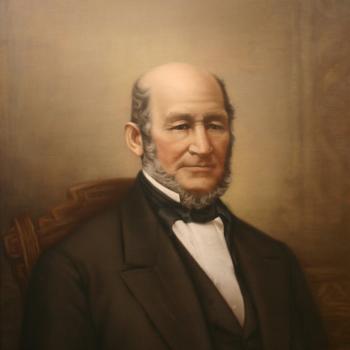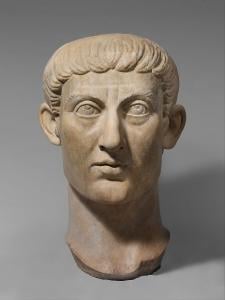
Emperor Constantine legalized Christianity in 313ce. Ten years later, what began as a multicultural minority movement centered on Jesus of Nazareth became an arm of the Roman Empire. Since then, Christianity split into two broad traditions: Empire Christianity and Jesus-follower Christianity. Empire Christians worship power, wealth, moralism, and certainty. Jesus-following Christians aim to act like Jesus, as the Gospels portray him: innovative, countercultural, compassionate, studious, brave.
As the Gospels portray him, Jesus loved crossing boundaries. He talked to and touched people that the dominant culture of his time had designated as outcasts. Conventional morality did not concern him. Except for taking a strong position against divorce and criticizing religious people for their moralism and hypocrisy, he did not condemn specific behaviors. He called out a group of violent religious people for considering themselves morally superior to a woman caught in adultery. Famously, he challenged, “let the one who has never sinned cast the first stone.” He tells the woman that he doesn’t condemn her and, like a kind but realistic parent, counsels her to avoid repeating the behavior.
The New Testament Jesus organized his life around studying the Jewish Scriptures, interpreting those Scriptures unconventionally, teaching, learning, traveling, praying, fasting, feeding people, healing people, building community, breaking social conventions, and listening for God. On occasion, he raised people after they were dead. The metaphorically inclined among us can think of that activity as breathing life into people and situations that lack vitality. Mitch McConnell has needed some Jesus-energy for years.
What about Wealth, Power, and Formal Education?
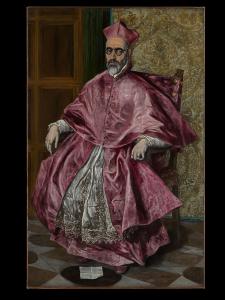
As the Gospels portray him, Jesus had no interest in wealthy, powerful, formally-educated people. He preferred to hang out with blue-collar types, social rule-breakers, and people without money. He liked and trusted women.
Morally speaking, Jesus taught that being aware of your own flaws matters more than your mistakes. Thinking you are morally superior to other people is the way to miss the mark completely. Jesus felt wary of priests, as persons most likely to lack flexibility. Jesus’s moral compass approached rules with flexibility. Religious people tried to catch Jesus breaking rules so they could make a big deal out of it and assert their own moral superiority. That sort of thing annoyed the beejeezus out of Jesus. He would rather eat dinner with a tax collector than a priest. Jesus loved maligned civil servants: tax collectors, like today’s IRS and other government workers, got a bad rap in ancient Rome. Jesus had compassion for government workers, but had harsh words for religious people who secured their own lifestyles by collaborating with the Roman empire.
Religion and Empire
In Jesus’s day, religious elites pursued power by cozying up to Roman Emperors and their henchmen. To these power-brokers, religion became a way to secure themselves a comfortable location in the Roman social hierarchy, accumulating wealth while using religious rhetoric to insulate themselves from being called out for their greed and callousness. What ordinary person, aware of their own social insignificance, would think to question the motivation of a holy roller, surrounded by other holy rollers? Holy rolling with the Roman Empire could be extremely lucrative, financially and socially. Wearing a cloak of religiosity helped self-seekers to milk the system with impunity. Jesus held that form of religious pretense in contempt.
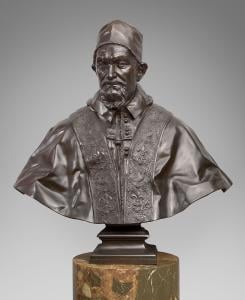
Holy rollers knew instinctively that Jesus and Jesus-followers posed a threat to their dominance. Unimpressed by wealth, power, and conventional religiosity, Jesus and his band of brothers attracted a good deal of attention among un-monied, un-powerful people. Ordinary people liked the way Jesus talked, liked his respect and care for them. They sensed something unusual, something life-giving and affirming in his spontaneity and social non-conformity, his fresh interpretations of their ancient religious tradition. Holy rollers sensed something dangerous to their privileged position in all of that. So they sought to turn the Empire against Jesus, which wasn’t hard to do. Empire-builders and holders-together are always terrified of losing cultural power. Jesus’s way of being imagined a cultural revolution based on overturning the dominant social hierarchy, prioritizing the needs of low-income vulnerable people over the ambitions of the rich and powerful.
Empire vs. Jesus
Jesus got evasive when the holy rollers tried to trap him into falling afoul of Rome by dissing Roman tax law. In Matthew 22:17, they ask Jesus, “Tell us . . . what you think. Is it lawful to pay taxes to the Emperor, or not?” Wily when he needed to be, Jesus asks to see a coin, asks whose head appears on it, and quips “Give . . . to the emperor the things that are the emperor’s and to God the things that are God’s.” I think this was his way of saying “Whatever, Man: I’m not here to beef against the Emperor. I’m here to call people to get closer to God, a higher reality than that of the Emperor.” Of course, that attitude is highly offensive to emperors and their cronies. Empire-power and spiritual power rarely go together.
Jesus was a political performance artist, spontaneously staging public spectacles that undermined the concept of Empire-power. Jesus’s riding-into-Jerusalem-on-a-donkey stunt subverted another kind of procession: Pontius Pilate riding into Jerusalem on a war horse, at the head of a military parade intended to showcase Roman imperial power. Hmmm. A Galilean peasant on a pack animal juxtaposed with a Roman military commander on a war horse. An audience of friendly peasants laying down their cloaks juxtaposed with a crowd cheering for cavalry soldiers with weapons. What might that performance be exploring? Jesus, donkey, and company call attention to the arrogance and absurdity of military parades, and illustrate a form of power based on humility.
Jesus modeled a power that arises from spirituality, originality, humility, community, and curiosity. He raised more questions than he answered. He tried to hear from God by praying, walking, talking, and breaking bread with people no one else wanted to know. Long-haired hippie type with dirty feet, he annoyed anyone who believed that wealth and might makes right. “My kingdom is not from this world,” Jesus tells Pilate during his trial. Jesus described another kind of kingdom–a spiritual kingdom where the least privileged people receive the most consideration. The most privileged people focus their energy on improving the lives of others.
The Way of Jesus vs. The Way of Empire
After his execution, Jesus’s followers tried to make sense of their Jesus experience. His closest friends felt like their Spiritual King was still alive. Then people who never knew Jesus felt like they could feel his aliveness in some way too. Fired up by mystical experience, these Jesus-followers started living differently from their Roman peers. They worshipped just one God instead of many. They shared money, food, and property. As Acts 2:46 tells the story, they “spent much time together in the temple.” They ate together, cultivated gratitude, and grew friendly relationships with their neighbors, welcoming folks from every ethnic group. They didn’t care what official Rome thought of them: they didn’t worry about acquiring wealth or climbing social ladders. Rome’s social hierarchy stopped being interesting. The spiritual kingdom of Jesus started ruling their hearts. Humility, community, curiosity, compassion, and care became king.
This countercultural movement lasted three hundred years. After Emperor Constantine appropriated Christianity for political purposes, something different began to emerge–something that looked just like Empire. The Holy Roman Empire replaced humility with hierarchy. To make the new Empire hold together, dogma replaced curiosity and originality. After all, to build and maintain church hierarchy, you have to know who is in and who is out. Dogma makes that possible. Christianity became a set of beliefs rather than a Way of Living. That’s why Christian enslavers could kidnap, imprison, enslave, torture, rape, and kill: if all you have to do to be a Christian is profess certain beliefs, then Christians can commit crimes against humanity. Since empires run on crimes against humanity, Empire Christians cannot be bothered with following Jesus. They just drop his name.
In Quaker tradition, we say that “Christianity is not a notion, but a Way.” Empire Christians profess certain notions. Jesus-following Christians practice a Way of Living that revolves around sharing resources, caring for the vulnerable, ignoring social hierarchies, healing what ails the folks around you, studying Scripture creatively, identifying your own flaws, forgiving people’s flaws, embracing outcasts, welcoming strangers, challenging self-righteous people, and opting out of preoccupations with money, status, and worldly power.
How Do You Tell the Emperor-Cronies from Jesus-Followers?
In the Gospel stories about him, Jesus offers advice for separating the sheep from the wolves in sheep’s clothing. In Matthew 7:15, Jesus says “You will know them by their fruits.” Paul explicates that metaphor in Galatians 5:22, in which he explains that the “fruit of the Spirit is love, joy, peace, patience, kindness, generosity, faithfulness, gentleness, and self-control.” Paul also explains how you know someone is not operating “in the Spirit.” Galatians 5:19 asserts that “enmities, strife, jealousy, anger, quarrels, dissensions, factions, envy,” and “drunkenness,” among other things, are signs of someone devoted to their own lust for power and pleasure.
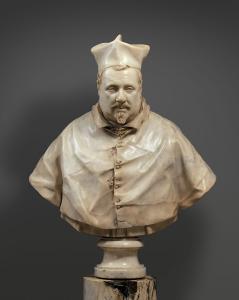
So we can separate the sheep from the wolves by examining their behavior, including the way they conduct conversations. Do you see peacefulness, patience, kindness, generosity, gentleness, self-control? That’s a sheep. Do you see enmities, strife, anger, quarrels, dissensions, factions, or drunkenness? That’s a wolf dressed up to look like a sheep. The same process works for distinguishing Empire Christians from Jesus-followers. Is the person dropping Jesus’s name fascinated by wealth, power, social status, and/or military dominance? Do they love grandeur, thrones, fancy clothes? That’s an Empire Christian. Does the person seem strangely uninterested in wealth, power, social status, and/or military dominance? Does the person seem especially concerned about the vulnerable, or willing to embrace people marginalized by the dominant culture? That might be a Jesus-follower. Could also be a kind-hearted Unitarian, Muslim, Jew, Sikh, secularist, humanist, or atheist.
Separating the Sheep from the Goats
According to the Gospel writers, Jesus also gave tips for separating the sheep from the goats–the actual followers of Jesus from the people dropping his name without enacting his values. In Matthew 25:34, Jesus explains that he recognizes his followers by how they treat vulnerable, marginalized or incarcerated people. Describing what delights him in his followers, Jesus says “I was hungry and you gave me food, I was thirsty and you gave me something to drink, I was a stranger and you welcomed me, I was naked and you gave me clothing, I was sick and you took care of me, I was in prison and you visited me.”
To make sure no one misses it, Jesus repeats himself. Describing what earns his revulsion, Jesus says “I was hungry and you gave me no food, I was thirsty and you gave me nothing to drink, I was a stranger and you did not welcome me, naked and you did not give me clothing, sick and in prison and you did not visit me.” Jesus equates himself with the neediest, most marginalized people in a community. Jesus-following Christians take care of those people. Empire Christians do not.
History demonstrates that power-hungry people readily deploy Christianity in all manner of Empire-building projects and personal quests for wealth, dominance, and social status. Empire Christians have been around a long time and God knows they’re still at it today. I hope no one mistakes them for having anything to do with Jesus, however many gold crosses or fancy clothes they wear. However often they stand next to emperors onstage, name-dropping.






